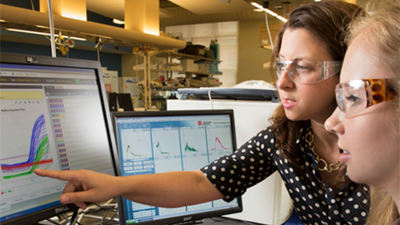Whitehead Wins DARPA Young Faculty Award

Hannah Diorio-Toth / 412-268-1208 / hdiorio@andrew.cmu.edu
Katie Whitehead, assistant professor of chemical engineering, has received the Young Faculty Award (YFA) from the Defense Advanced Research Projects Agency (DARPA). The award is designed to "identify and engage rising research stars," according to DARPA.
As a YFA awardee, Whitehead will receive a two-year, $500,000 grant to support her lab's research endeavor into creating drug delivery systems for next-generation gene therapy. The goal of the project is to develop nanoparticle materials that can precisely deliver messenger RNA (mRNA) to target cells in the body for a specific length of time. Her lab will focus on making sure that these delivery systems are not only effective, but also safe.
A budding new field of research, mRNA delivery has the potential to be a disruptive treatment in the medical field. Delivering mRNA to specific cells in the body would provide doctors with a targeted way to treat genetic disorders caused by missing or malformed proteins. For example, Whitehead explained that the technology could be used to treat hemophilia by delivering mRNA to the liver.
"One of the biggest challenges with using mRNA for gene therapy is accurately delivering it to the cytoplasm of a cell," Whitehead said. "My lab is well-positioned to tackle this challenge because of our experience in using nanoparticles for the targeted delivery of other nucleic acid drugs."
This research project will explore fundamental questions about how a drug delivery system causes mRNA to localize inside the body. Whitehead and her lab will use high-throughput chemistry methods to develop the nanoparticle delivery systems — in other words, her group will synthesize and test hundreds of distinct nanoparticles to identify the right chemistry that could be used to deliver mRNA without causing toxicity.
"It's exciting to work in an understudied area like mRNA delivery. The opportunities for discovery and advancement in the field are wide open," Whitehead said. "Through our fundamental approach, we expect to have a significant impact on the field of gene therapy by bringing improved understanding to this class of technology."
Related: